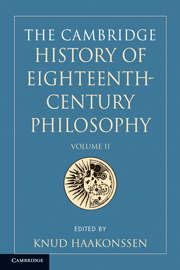35 - Social Sciences
from V - Moral Philosophy
Published online by Cambridge University Press: 28 March 2008
Summary
PROGRAMS IN SEARCH OF A SCIENCE
The briefest useful summary of some of the chief topics of eighteenth-century thought concerning the social, or moral, sciences was written by the nineteenth-century entrepreneur of social reform, Robert Owen. The summary forms the long title of one of the many editions of his program for a ‘new moral world’: ‘An Outline of the Rational System of Society, founded on demonstrable Facts developing the Constitution and Laws of Human Nature being the only effective Remedy for the Evils experienced by the Population of the World: the immediate Adoption of which would tranquilize the present agitated State of Society’ (1830). The search for demonstrable facts, and for the true character and laws of human nature, in the interests of immediate social therapy was a characteristic feature of eighteenth-century thought in Europe. It was characteristic because the success of Newtonian physics at the end of the seventeenth century powerfully stimulated interest, early in the eighteenth century, in the development of an analogous science of social topics. Advocacy of the application of the new ‘experimental philosophy’ of such natural scientists as Hooke, Boyle, and Newton to the problems of society was difficult to resist. Not only were the problems urgent and general, but the benefits might be great. Investigators had only to proceed on the assumption, as Hume later put it in the Treatise (1739–40), that there is a close similarity between the uniformity of nature and the ‘uniformity of human actions’. For if that is true, then it follows that ‘in judging of the actions of men we must proceed upon the same maxims, as when we reason concerning external objects’.
- Type
- Chapter
- Information
- The Cambridge History of Eighteenth-Century Philosophy , pp. 1069 - 1106Publisher: Cambridge University PressPrint publication year: 2000
References
- 1
- Cited by

